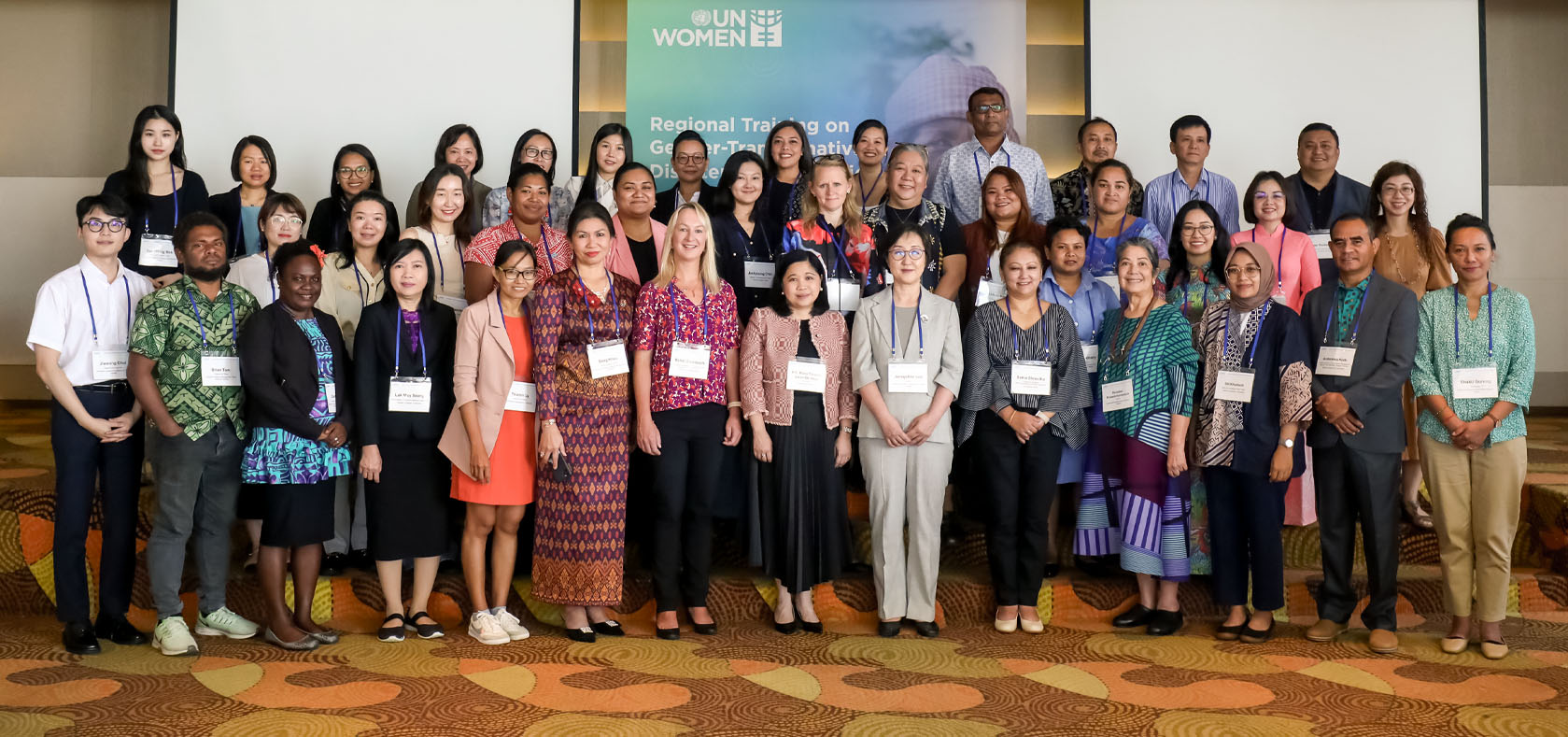[Press release]

Over 40 government representatives and experts from 12 countries in Asia and the Pacific, joining a ‘Regional Training on Gender-Transformative Disaster Risk Reduction,’ are taking a photo. Photo: UN Women/Kwanju Kim
English | 한국어
Seoul, Republic of Korea — 44 government representatives and experts from 12 countries in Asia and the Pacific joined a regional training workshop on advancing gender-transformative disaster risk reduction (DRR) hosted in Seoul, Republic of Korea.
Gender-transformative disaster risk reduction (DRR) refers to an approach that acknowledges and addresses the distinct needs, roles, capacities, and vulnerabilities of different genders in the context of disaster preparedness, response, and recovery. It goes beyond gender-responsive DRR by actively challenging and changing underlying gender inequalities and norms, aiming to create lasting gender equality and inclusivity in disaster resilience efforts.
Hosted by UN Women Centre of Excellence for Gender Equality and UN Women Regional Office for Asia and the Pacific from 6 to 8 September, the training brought together policymakers and activists working in the field of disaster risk reduction with the aim of strengthening their skills and capacities on gender analysis and gender mainstreaming. The event included participants from Bangladesh, China, Fiji, Indonesia, Kiribati, Malaysia, Pakistan, the Philippines, the Republic of Korea, Solomon Islands, Thailand, and Viet Nam.
A recent study, over a million lives and over a trillion dollars have been lost in Asia and the Pacific over the last 50 years due to weather, climate and water extremes. The year 2022 alone stood as a stark reminder, tallying economic losses to the tune of $57.3 billion, impacting a staggering 64.3 million people across the region. Women and marginalized groups have limited access to information, resources, and technologies, coupled with restricted decision-making power. This leads to their exclusion from disaster prevention and preparedness processes, as well as hindering their access to post-disaster assistance, compensation, recovery, and rebuilding efforts.
On the first day, participants explored the interlinkages between gender equality and disaster risk reduction along with policy and legal frameworks for gender transformative DRR. On the second day, they will learn about tools and approaches to mainstream gender in DRR policies and plans. The final day the workshop will focus on gender-responsive preparedness and gender-responsive recovery. Then, the participants will jointly develop an action planning including concrete actions and next steps at the country and regional levels.

Jeongshim Lee, Director of the UN Women Centre of Excellence for Gender Equality, is opening the three-day event ‘Regional Training on Gender-Transformative Disaster Risk Reduction.’ Photo: UN Women/Kwanju Kim
Jeongshim Lee, Director of the UN Women Centre of Excellence for Gender Equality, explained: "Participants will enhance their understanding of how the impacts of disasters are highly gendered. We expect this workshop to accelerate the design, implementation and monitoring of DRR policies and programs in Asia and the Pacific to strengthen women's resilience and elevate their power in natural disaster preparedness, response and recovery."
Attending the opening, Maria Theresa B. Dizon-De Vega, Ambassador of the Philippines to the Republic of Korea, congratulated for UN Women Centre of Excellence for Gender Equality its tremendous efforts in strengthening the partnership and network among countries in Asia and the Pacific to advance gender equality to accelerating sustainable development. She emphasized, “When women's capacities, knowledge and skills are utilized in disaster risk reduction efforts, we will all benefit.”
Maria Holtsberg, Regional Advisor for Humanitarian Action, DRR and Climate for UN Women Regional Office for Asia and the Pacific, stated that "UN Women is working to foreground the needs of women and girls and support their full engagement at all levels of decision-making related to disaster risk reduction. UN Women is committed to bringing together governments and civil society organizations to foster a culture of learning and accountability to accelerate gender transformative disaster risk reduction."
The training follows the module on gender transformative disaster risk reduction that was developed by UN Women Regional Office for Asia and the Pacific, supported by the Centre of Excellence for Gender Equality in 2022 and drawn on the wealth of materials and resources from the Women’s Resilience to Disaster Knowledge Portal. This is the third time that the Centre has organized events exploring the intersectionality between gender and climate change, following 'Enhancing Capacity from Design to Action: Gender-Responsive Rights-based Climate Action' and 'The 2nd Policy Forum on an Integrated Approach to Climate Change, Gender, and Science and Technology.'

